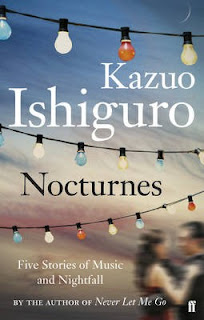Nocturnes by Kazuo Ishiguro
What the Back of the Book Has to Say:
In Nocturnes, Kazuo Ishiguro explores the ideas of love, music and the passing of time. From the piazzas of Italy to the 'hush-hush floor' of an exclusive Hollywood hotel, the characters we encounter range from young dreamers to cafe musicians to faded stars, all of them at some moment of reckoning.
Gentle, intimate and witty, this quintet is marked by a haunting theme: the struggle to keep alive a sense of life's romance, even as one gets older, relationships flounder and youthful hope recedes.
Why I Picked It Up:
I had really enjoyed Never Let Me Go and wanted to read more of Ishiguro's work.
What I Think:
Nocturnes is a series of short stories that revolves around music, nightfall and the changes love goes through over passage of time. Ishiguro wrote all of them to go together, a sort of musical piece in movements, with reappearing themes, characters and locations. Although they are all separate short stories, it's easy to notice the connection between them.
The first (and best, in my opinion) story, Crooner, tells the story of a young piazza musician in Italy meeting one of his idols from childhood and performing with him for the singer's wife. The mood, the feeling, the melancholy romance really set the tone for the coming stories and establish an atmosphere of love and regret that will haunt all of the coming stories.
Crooner is followed by Come Rain or Come Shine, the story of a man who has lived abroad since college teaching English. He returns to his native England for a vacation, staying with a couple, his old friends from college. While most of the story is a kind of strange physical comedy with him overreacting while alone in their home, the strange sense of the weariness that comes from the strain of a relationship over time really culminates in the last few paragraphs. If you make it that far.
Next is Malvern Hills, the story of a failing young musician that goes to stay with his sister and her husband in their rural town for the summer, to work on his music and help in their cafe. While there, he meets a travelling Swiss couple who he almost immediately dislikes but after a few more encounters in the hills, their relationship changes into a sort of camaraderie. It isn't until their last meeting that he realizes how fragile relationships like that can be.
Nocturne, the titular story, actually continues a thread (well, a character) from the first story, Crooner. Due to a twisted sense of logic, a saxophonist agrees to plastic surgery and has to hide out in a hotel while he heals. He ends up becoming sort of friends with his neighbor, an aging Paris Hilton-type. Despite a few evenings of true bonding, however, our narrator is forced to confront that he never will completely respect her.
Last is Cellists, a return to our Italian piazzas and the story of a young man with ambition and an aging woman with a lot of talent and a bit of a mysterious air about her. Told from the point of view of a man who used to work with the young man once, we see the sad mistake of waiting too long to make your own miracle happen.
One interesting stylistic choice Ishiguro has made in these stories is to use narrators who are both unreliable and not the main focus of the story at all. Perhaps they reveal more about themselves than they realize in their monologues but the narrator is always telling someone else's story, whether they realize it or not. This distance from characters adds to the atmosphere, making the stories both harder to interpret and hazier than his other works.
Each story contains an element of the musical, usually pertaining to a character's wasted potential. A musician who is too afraid to improve, a saxophonist who's talent is overshadowed by his looks and age, a performing couple who fear they are selling out their heritage. The music they play or associate with themselves becomes a symbol of their ideal selves that they are, unfortunately, never going to live up to.
To be honest, while I found the stories all very interesting as I read them, I can't say that I particularly enjoyed the book. Despite my affinity for the regretful romance trope in literature, I can't say that any of these stories really struck a tone with me. I was curious what the general response was when this book first came out and I searched out some reviews. A good number said, while they might not strike you at first, they haunt you afterwards. Personally, I don't consider myself haunted.
Now, to be honest, there definitely is a certain mood the novel evokes and perhaps that feeling has stuck with me a bit. But I'm only writing this review perhaps four days after finishing the book and had to quickly remember what half of the stories were. I don't think that says much for their ethereal quality.
Perhaps I'm just uncultured but I can't say that I particularly enjoyed Nocturnes. I do find that I am in the minority with that, though, so I will leave you to your own explorations.


No comments:
Post a Comment